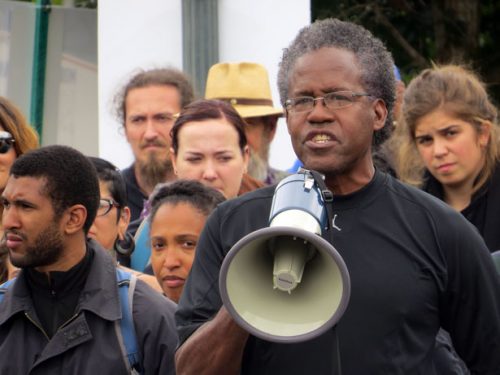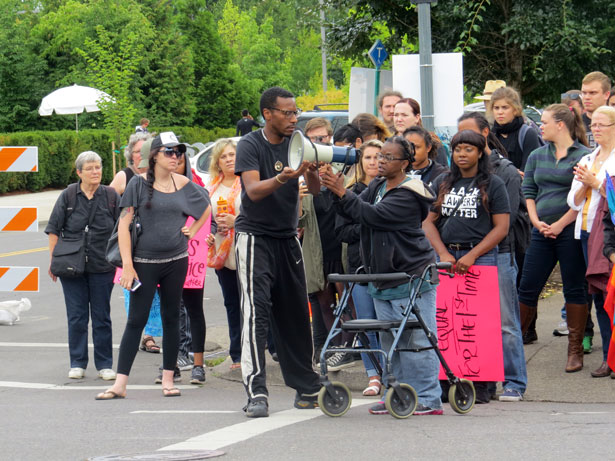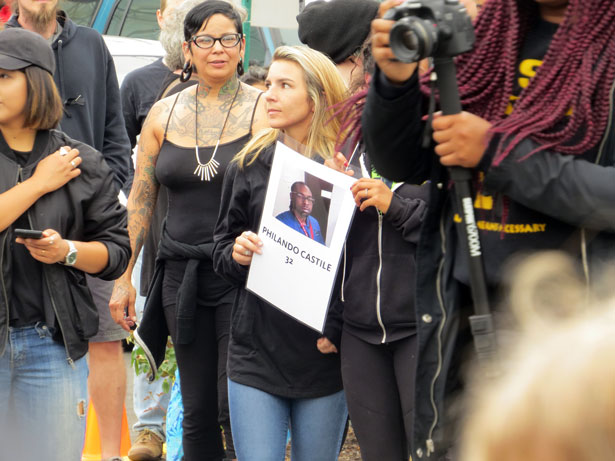
After a string of violent shootings across the nation last week, hundreds of people convened on the University of Oregon campus Friday, July 8, to remember black lives lost at the hands of police officers, including Alton Sterling of Louisiana and Philando Castile of Minnesota. At the vigil, leaders also mourned the lives of five police officers killed in Dallas, Texas.
Members of the Eugene/Springfield NAACP, the University of Oregon’s Black Student Union and the Black Women of Achievement organized the vigil, while members of Showing Up for Racial Justice (SURJ) Springfield-Eugene chapter attended in support.
Addressing a crowd gathered in the Erb Memorial Union amphitheater as rain gently fell, youth pastor Kim McGrew of the Powerhouse Worship Center delivered a moving speech that focused on action and implementing change in the face of great negativity.
“I need you to remain positive,” McGrew said. “There’s already enough negativity that’s going throughout the nation, and they don’t need to see it on the UO campus.”
McGrew spoke to a solemn, introspective audience as she urged people to act as agents of change. “One thing I want you to be reminded of is that we’re a melting pot,” McGrew said as she gestured around the amphitheater and encouraged people to look at their neighbors. “Every nationality is right here on the UO campus. You can see the world sitting right here, saying, ‘We stand for one. And we stand for all.’”
McGrew, who is African-American, shared that she is from Dallas and that she knew many of the officers shot the evening of July 7 at a rally in protest of police violence against black people, calling the deaths by sniper “another tragedy.”
At the July 8 vigil, McGrew asked people to no longer stay silent or hold their opinions to themselves. “Today, I set a new standard,” she said. “Defy the odds and step up.”
She called on the audience to act as leaders in the community to be a voice of reason, “regardless of the obstacles that may be against you. I need you to view this challenge as an opportunity.”
 |
| Members of the Crowd take turns speaking about their personal experiences with violence and racism |
She condemned further violence and said that this is an opportunity to stand together instead of standing divided.
“Black lives matter,” McGrew said. “White lives matter. Brown lives matter. Everybody’s lives matter today because after last night, everyone can become a statistic.”
As she finished her speech, she prayed for the group present, for the community and for the nation as a whole, and silence fell on the amphitheater as the people present honored the lives lost to violence.
Student activist and previous co-director of the UO Black Student Union Nicole Dodier then spoke to the crowd, saying, “The longer we continue to be silent about these issues, the more black bodies will be laid to rest. We march here today to be visible, to show the world that we are fed up.”
She said action must be taken to resolve police violence against the black community.
“As I scroll down social media, I see a lot of backlash about our movement, folks saying that all lives matter. However, what many people fail to realize is that all lives cannot matter until the black community matters,” Dodier said. “And we cannot fight these battles alone. We need our allies to speak up and get behind us in leading the change. I find these truths to be self-evident, that black lives matter.”
Carter McKenzie, who attended the vigil, is a member of SURJ Springfield-Eugene, a chapter of a national network that organizes white people for racial justice in solidarity with communities of color.
She and nine other members of SURJ Springfield-Eugene attended the vigil, and McKenzie tells EW that they were there to “support the amazing young black leaders who organized this.”
McKenzie says she was moved by McGrew’s words. “She spoke of positive agents of change,” McKenzie says. “She was really saying, ‘We need to do the work with our hearts open and with resolve, to not just react but act thoughtfully.’”
After the vigil, the crowd marched down 13th Avenue through campus, crying out, “Black lives matter!” and “United we stand, divided we fall” while carrying signs.
Members of the crowd held pictures of black men and women slain by police officers and placed the photos on Hamilton Hall lawn to memorialize those killed.
At the intersection of Agate Street and 13th, organizers passed the megaphone to audience members, who shared their thoughts with the crowd.
Kayla Godowa-Tufti, a member of the Confederated Tribes of Warm Springs, spoke in solidarity with the black community.
“I feel the grief because they killed us, too,” she said. “They wanted us dead, too. If all of us stand together, there is no way this empire can ever survive. We need to stop the killing. Everyone needs to stop killing each other.”
McKenzie tells EW that the Springfield-Eugene chapter of SURJ started last summer after the Charleston church massacre, in which a white man murdered nine men and women of color. McKenzie’s family was in Charleston when the shooting happened, and she says at that moment she decided she had to work toward change.
 |
| Protesters planted pictures of black men and women lost to police violence on the Hamilton Lawn on the UO Campus |
“Our mission is calling people in,” she says. “There are people who are white and are bothered by racism but don’t know how to move forward. A common feeling is you think you’ll say the wrong thing, but this is trying to break the paralysis. This is hard work, and it’s risk taking and you’re going to make mistakes. We’re working in partnership with people of color as allies.”
McKenzie says she encourages people who want to work toward racial justice to contact SURJ Springfield-Eugene by emailing surj-info@googlegroups.com or visiting its Facebook page. The group meets monthly.
She shares a quote from Anne Braden, a white anti-racist activist who inspired the National SURJ movement:
“As long as people of color can be written off as expendable, and therefore acceptable victims of the most extreme inequities, none of the basic injustices of our society will be addressed; they will only get worse.”
One of the simplest ways to stand up against gun violence and police brutality is to contact your elected officials and tell them how you feel: Senator Jeff Merkley at merkley.senate.gov/contact or 202-224-3753; Senator Ron Wyden at wyden.senate.gov/contact or 202-224-5244; Representative Peter DeFazio at bit.ly/29BfhGt or 202-224-3121.